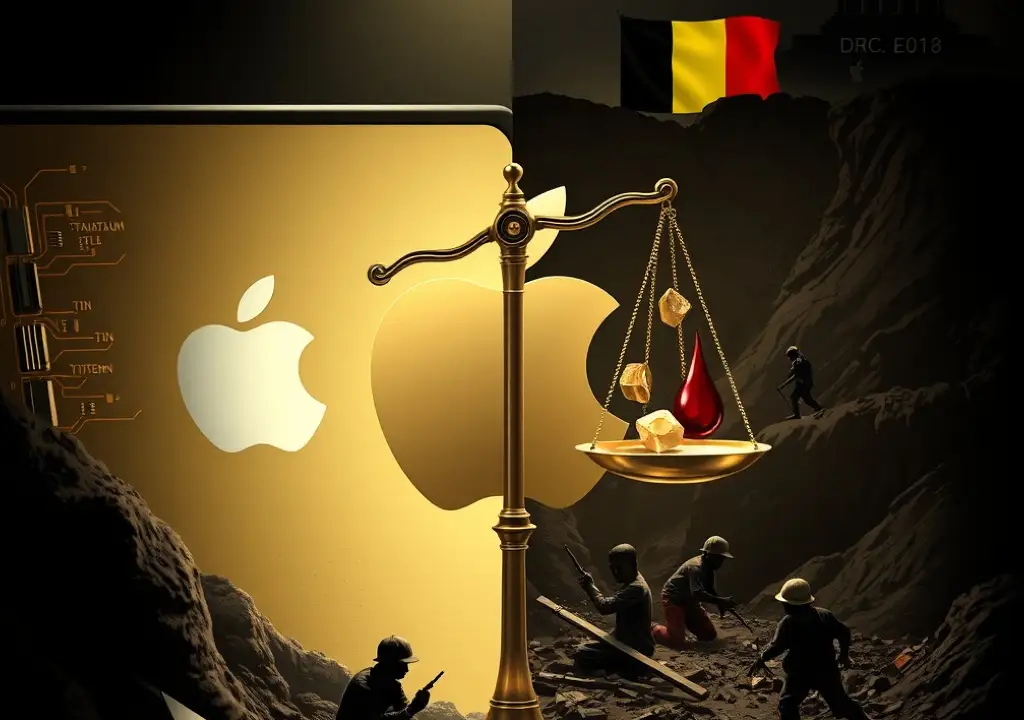The Democratic Republic of the Congo (DRC) has initiated criminal complaints against Apple’s subsidiaries in France and Belgium, accusing the tech company of benefiting from “conflict minerals” sourced in sub-Saharan Africa. Lawyers representing the DRC allege that Apple uses these minerals while misleading the public by claiming its supply chains are clean and responsible.
What Are Conflict Minerals?
Conflict minerals refer to natural resources extracted from areas plagued by conflict. Countries such as the DRC, Sierra Leone, and Venezuela are known sources. As defined by the Organisation for Economic Co-operation and Development (OECD), conflict minerals include tantalum, tin, tungsten, and gold – collectively called 3TGs. These minerals are widely used across industries: tantalum is vital in capacitors for electronics, tin in cars and packaging, tungsten in tools and bulbs, and gold in both jewelry and electronic devices. Many human rights groups have raised concerns over the poor working conditions in mines, including forced and unpaid labor.
Which Conflict Minerals Come From the DRC?
The eastern region of the DRC is rich in 3TGs. It has been the center of violent conflict for decades, with over 200 armed groups competing for control of mines. According to Global Witness, rebels occupy these mines and transport routes, forcing miners to work without pay and smuggling the minerals out, mainly through Rwanda. Once smuggled, the minerals are legally exported and may find their way into the supply chains of global tech companies.
Why Are Conflict Minerals Controversial?
Revenue from conflict minerals is believed to fund armed groups. For example, the M23 rebel group, backed by Rwanda, reportedly controls coltan extraction in Rubaya – a region providing about 15% of global tantalum used in phones and laptops. Coltan has fetched prices between $39 and $43 per kilo this year. Christoph Vogel, an expert on the issue, notes that armed groups often earn more through illegal taxation and border control than direct mining profits.
Why Is Apple Being Targeted by the DRC?
In September last year, President Felix Tshisekedi met with lawyers from Amsterdam & Partners LLP to investigate illegal exports of 3T minerals from the DRC. By April, the lawyers had written to Apple CEO Tim Cook, stating that Apple’s supply chain may be connected to “blood minerals.” Apple subsidiaries in Europe were also contacted, but the DRC received no timely response. Apple replied that, as of December 2023, no evidence linked its smelters or refiners to armed groups. In December, the DRC filed criminal complaints against Apple’s offices in France and Belgium. Lawyer Robert Amsterdam stated Apple should be held accountable rather than hiding behind “false narratives” of clean supply chains.
Apple’s Response
Apple has denied all allegations. In a public statement, the company said that due to escalating regional conflict, it had ordered its suppliers to stop sourcing 3TG minerals from the DRC and Rwanda. Apple emphasized that it uses recycled minerals and that proper auditing and certification were no longer possible due to instability. However, the DRC’s legal team insists these claims must be independently verified.
Will the Case Go Forward?
Yes. The legal team representing the DRC intends to proceed with the lawsuits in European courts. Lawyer Christophe Marchand said the case is significant, especially as European nations and organizations are increasingly concerned about ethical supply chains. The legal team also urged the European Commission to take responsibility in breaking the link between conflict and mineral exploitation.
Why Are Proceedings Taking Place in Europe?
The European Union has rules ensuring that companies sourcing 3TG minerals meet OECD standards. These rules are designed to ensure ethical sourcing, prevent abuse of local mining communities, and support local development. The DRC’s legal representatives have called on European Commission President Ursula von der Leyen to take action but have yet to receive a reply. Their goal is to expose wrongdoing and push for ethical reforms in mineral sourcing.
Have Other Companies Used Conflict Minerals?
Yes. A 2022 report by Global Witness found that companies including Intel, Samsung, Nokia, Motorola, and Tesla may also have conflict minerals in their products. Many firms reportedly do little to identify smuggling, child labor, or links to armed conflict within their supply chains. Although Apple has promoted itself as a leader in responsible sourcing, it has been warned repeatedly about smuggling risks.
How Should Companies Ethically Source Minerals from the DRC?
The OECD recommends a five-step due diligence process for conflict minerals. This includes establishing transparent supply chains, identifying and managing risks, using third-party audits, and publicly reporting findings. U.S. law also mandates companies disclose whether their products contain conflict minerals and provide detailed reports if so. Kopp suggests that DRC authorities must do more to combat smuggling and that the international community should pressure Rwanda to stop backing rebel groups and tighten border control.

